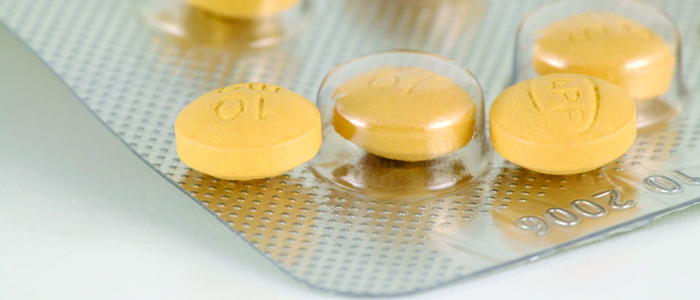NMS proves its worth
In News
Follow this topic
Bookmark
Record learning outcomes
The new medicine service improves the likelihood of adherence by almost 70 per cent while reducing cost at the same time, according to an evaluation by Nottingham University and University College London. Will it now be made permanent? Report by Mark Greener

THE TRIAL, which was commissioned by the Department of Health, involved 46 community pharmacies in the East Midlands, South Yorkshire and London.
Pharmacists enrolled 504 patients taking newly prescribed medicines for hypertension (49.4 per cent of those enrolled); asthma or COPD (23.2 per cent); type 2 diabetes (18.8 per cent); or as anticoagulants or antiplatelets (8.5 per cent).
The NMS assesses adherence by asking: €People often miss taking doses of their medicines, for a wide range of reasons. Have you missed any doses of your new medicine, or changed when you take it?€
Ten weeks after starting the medication, 60.5 and 70.7 per cent of patients still prescribed their initial medication were adherent in the current practice and NMS arms respectively. After adjusting for potential confounders, people in the NMS arm were 67 per cent more likely to be adherent.
Similar results emerged using a composite outcome that included patients where the prescriber stopped or changed the medication: 64.9 and 74.7 per cent were adherent in the current practice and NMS arms respectively €“ a 68 per cent improvement. The benefits of NMS were €very similar€ across the four areas, although numbers in some groups were small.
Cost savings
Mean NHS costs in the current practice and NMS arms were £260.87 and £215.16 respectively. After including service costs, NMS interventions saved £21.11 per patient. This difference was not statistically significant, possibly because of the small sample.
Nevertheless, the authors remark that the finding €demonstrates that NMS service costs can be countered by reduced NHS contact costs€. Indeed, probable recruitment bias, self-reported adherence and variations in NMS delivery suggest that the benefits identified in the study may be conservative estimates. The study also revealed that:
- A pharmacy's characteristics influence the effectiveness of the NMS. For example, the top recruiting pharmacies showed €a culture of providing services to patients €¦ team cohesion and a clear 'can do' attitude€
- Patients whose NMS was conducted by a small multiple were almost twice as likely to be adherent as those reviewed in an independent (odds ratio 1.00 and 0.57 respectively). Results for large multiples and supermarkets were €inconclusive€
- Patients are more likely to be adherent if the pharmacy is €co-located with a general practitioner€
- Pharmacies with higher numbers of staff are better able to manage and deliver the NMS without placing excessive burdens on staff.
Integration key
The authors suggest that the NMS should become €more patient-focused and less didactic€ and better integrated into overall care pathways through:
- Improved GP engagement
- Pharmacists being able to access GP records
- Improved pharmacist training
- Expanding the range of medicines covered; for example into mental health. The RPS and PSNC both welcomed the findings
€The NHS is constantly challenged to provide evidence of the effectiveness of interventions; here we have a rigorous and thorough piece of work that leaves me in no doubt that this service is benefitting patients through improved use of medicines as well as saving money through fewer hospital admissions,€ commented David Branford, chairman of the English Pharmacy Board. €NHS England must now allow more people to benefit from this service. I would suggest that people with depression and dementia would be a wise place to start a wider roll-out.€
The profession must not shy away from some of the findings, he added. €In my view, if you haven't got enough support staff or the right IT, then the pharmacist's ability to deliver excellent care is compromised.
€NHS England must provide the right environment in every pharmacy, so pharmacists can deliver a fantastic service.€ PSNC said it plans €to build on that capability to see pharmacies delivering a whole range of care for patients, including longitudinal care for those with long-term conditions rather than just episodes of care as and when they meet certain criteria.
€We are not there yet, but this evaluation is certainly a big step in the right direction,€ commented Gary Warner, chairman of the service development sub-committee. The study can be found at www.nms.evaluation.org.uk.
